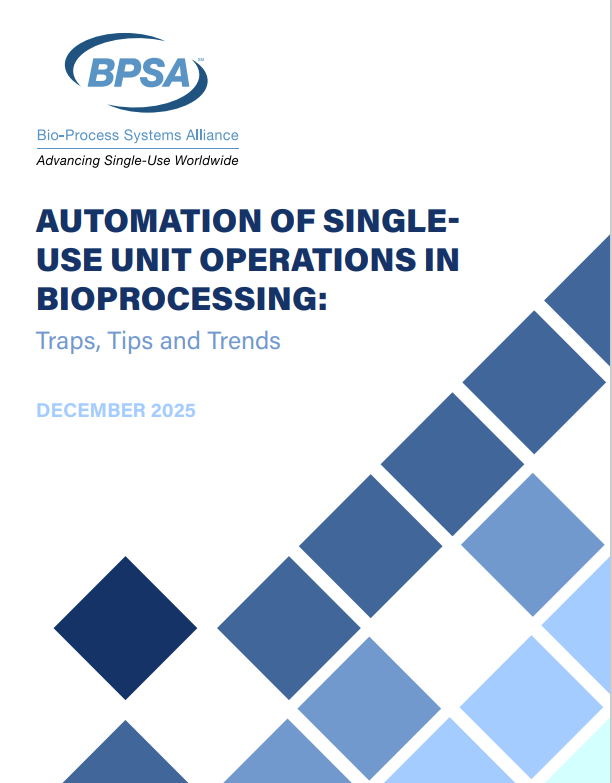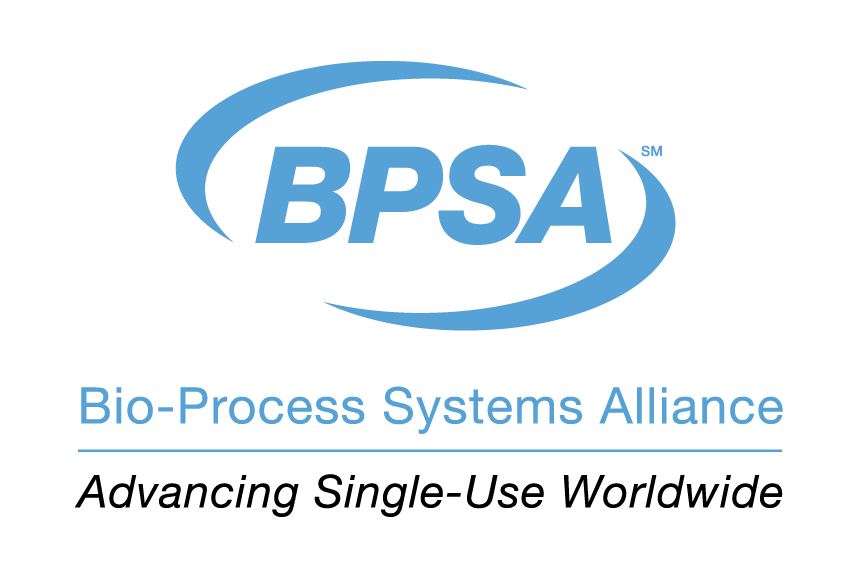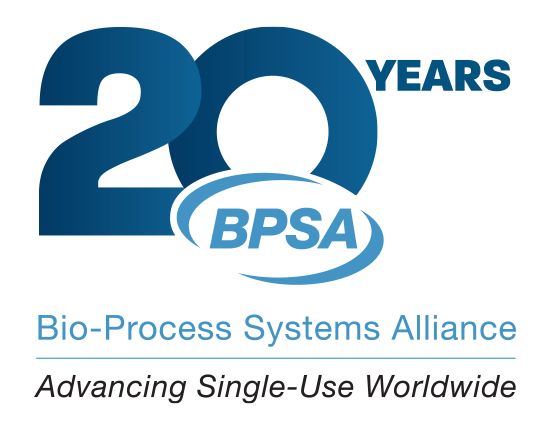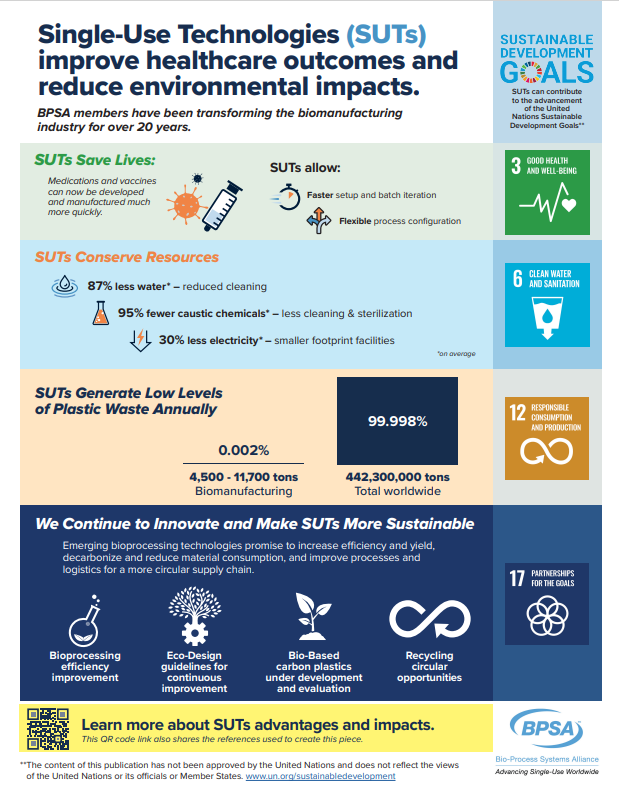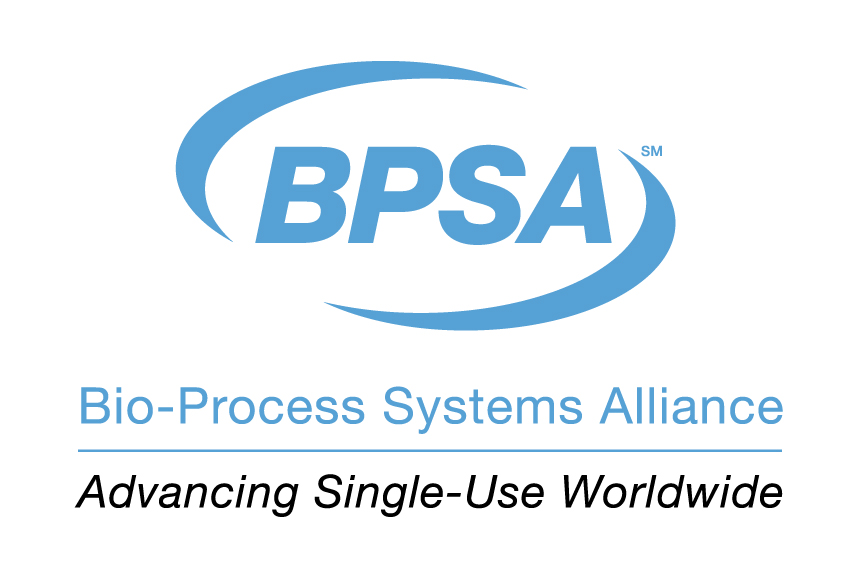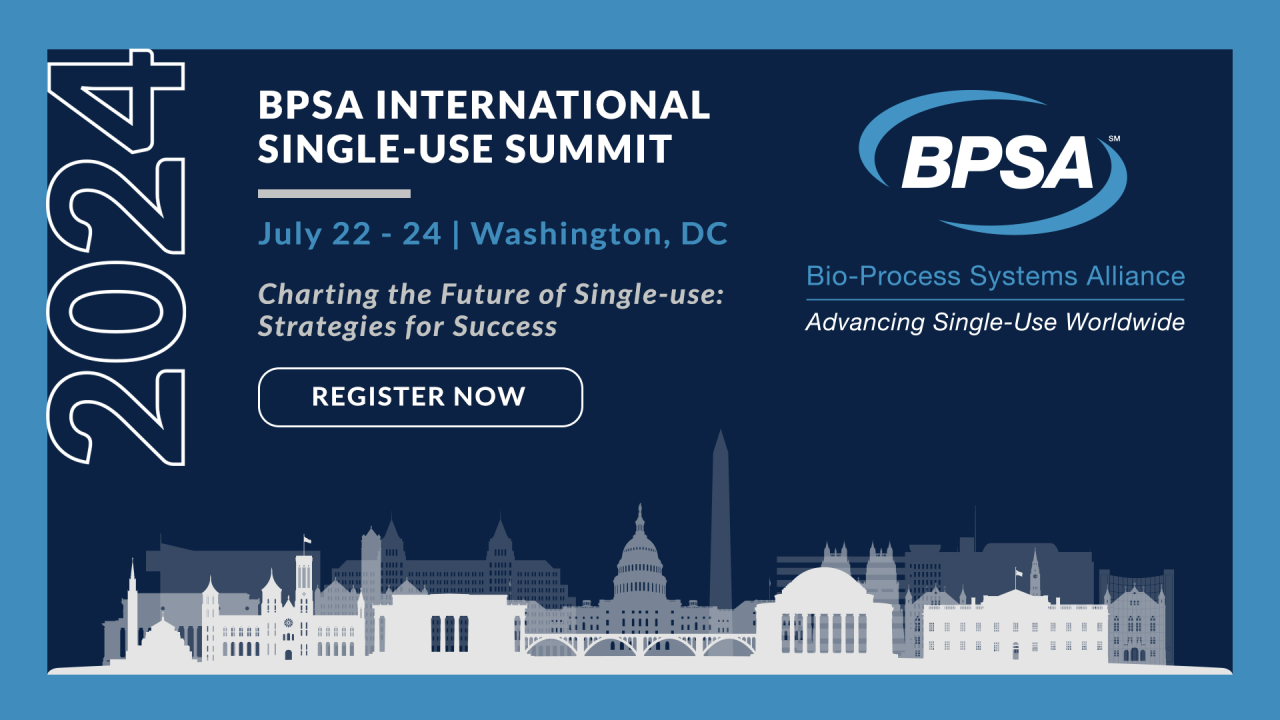| December 17, 2025, (ARLINGTON, VA) – The Bio-Process Systems Alliance (BPSA) is pleased to announce the publication of its latest technical resource, Automation of Single-Use Unit Operations in Bioprocessing: Traps, Tips & Trends. Automation in bioprocessing—especially for single-use systems—can boost efficiency and consistency, enable real-time control, and support flexible and scalable manufacturing. This comprehensive white paper provides practical guidance for suppliers and end-users of single-use systems integrating automation into single-use bioprocesses. The document presents the perspective of two personas with different backgrounds in automation and single-use technologies, and addresses key topics including: -Fundamentals of automation and control strategies for single-use systems -Common pitfalls and best practices for implementation -Real-world examples of highly automated bioprocessing facilities -Insights on digital communication and data integrity Developed by the BPSA Automation Committee, this white paper aims to bridge the knowledge gap between automation engineers and single-use technology specialists. It is designed to help companies improve efficiency, reduce risk, and accelerate innovation in bioprocessing. “This white paper represents a significant step forward in helping our industry automate systems and processes, enabling us to get important, life-saving products to our customers, patients and consumers faster. I especially want to thank the two co-chairs of the BPSA Automation Committee, Stuart Tindal, EngD, PhD of Sartorius, and Hernan Parma of Renolit Healthcare, for their leadership,” said Chris Clark, BPSA Executive Director. “I also want to thank and congratulate the broader BPSA Automation Committee for their dedication and collaboration in producing this important BPSA resource.” The white paper is now available for download at: https://www2.bpsalliance.org/forms/store/ProductFormPublic/automation-of-single-use-unit-operations-in-bioprocessing-traps-tips-and-trends About BPSA The Bio-Process Systems Alliance (BPSA) is an industry-led trade association dedicated to advancing the adoption and implementation of single-use technologies in biopharmaceutical manufacturing. For more information, visit www.bpsalliance.org. Contact: Christopher Clark Executive Director 571-348-5109 cclark@socma.org |
Tag: Industry News
December 11, 2025, 2025 (ARLINGTON, VA) – The Bio-Process Systems Alliance (BPSA), the international association for the single-use bioprocessing industry, has announced its newly elected Board members for the 2026–2027 term.
Todd Andrews, Global Director of Application and Business Development, Biopharma at CPC, was re-elected as Secretary for a second two-year term. Ravi Narayanan, Commercial Vice President, Fluid Management & Flexibles at DuPont Healthcare Solutions, was re-elected as Treasurer for a second two-year term. Andrews has more than 20 years of experience in the single-use biopharma industry, focusing on connection technology, and has been an active BPSA member for over 15 years. Narayanan brings over 20 years of experience serving the biopharma and medical device industries and has previously led global product management for biopharma single-use components at Nordson Medical.
Two new Directors-at-Large were elected for two-year terms: Sade Mokuolu, PhD, Regional Business Development and Marketing Manager at Watson-Marlow Fluid Technology Solutions (WMFTS), and Brian Horowski, Director, Process Technologist at IPS. Mokuolu has held a range of senior business and technical positions, including strategy implementation lead, global regulatory and validation services manager, and actively contributes to multiple industry workstreams. Horowski has more than 20 years of experience in facility design for bulk drug substance manufacturing, including monoclonal antibodies, recombinant proteins, gene therapies, and vaccines.
Additionally, Monica Cardona (MilliporeSigma), Brian Chung (Syensqo), Dianne Heiler (Repligen Corporation), John Puglia, PhD (Thermo Fisher Scientific), and Thomas Vandromme (Meissner) were re-elected as Directors-at-Large for two-year terms (2026–2027).
“Congratulations to Todd and Ravi on their re-election as Secretary and Treasurer. I appreciate that they have volunteered to continue managing significant roles in our organization,” said BPSA Chair Mark Petrich of Krystal Biotech, Inc. “I also congratulate all our new and returning Board members. Their extensive experience and leadership will be essential in guiding the Alliance forward. On behalf of the BPSA, I offer a special thanks to Jayanthi Grebin of JLG Life Science LLC and Chris Wilkins, PhD, of Filtration Group for their invaluable contributions as Directors-at-Large as their terms conclude this year.” Petrich continued, “For more than 20 years, BPSA has facilitated the growth of single-use technologies and contributed to their implementation in critical biopharmaceutical manufacturing operations. Single-use technologies are important tools in the quest to improve the health of patients and consumers. I look forward to working with this talented board of directors to address opportunities and needs in our industry.”
BPSA Executive Board Officers:
Chair: Mark Petrich, PhD, Krystal Biotech
1st Vice Chair: Todd Kapp, Kivi Bio, LLC
2nd Vice Chair: Kirsten Strahlendorf, Sanofi
Secretary: Todd Andrews, CPC
Treasurer: Ravi Narayanan, DuPont
At-Large Directors (newly elected through 2027):
Brian Horowski, IPS
Sade Mokuolu, PhD, Watson-Marlow
At-Large Directors (continuing through 2026/2027):
Monica Cardona, MilliporeSigma
Brian Chung, Syensqo
Ralph Daumke, PendoTECH
Patrick Evrard, Cytiva
Dianne Heiler, Repligen Corporation
Charlotte Masy, PhD, GSK
Hernán Parma, RENOLIT Healthcare
John Puglia, PhD, Thermo Fisher Scientific
Stuart Tindal, EngD, PhD, Sartorius
Thomas Vandromme, Meissner
Ping Wang, PharmD, Johnson & Johnson
Board members are elected by BPSA’s general membership to serve staggered two-year terms. They establish governing policies, determine budget priorities, and set strategic goals to advance the Alliance and its mission of supporting the single-use bioprocessing industry globally. Click here for a complete list of BPSA Board of Directors.
About BPSA: An affiliate of SOCMA, The Bio-Process Systems Alliance (BPSA), is an industry-led association dedicated to encouraging and accelerating the adoption of single-use manufacturing technologies used in the production of biopharmaceuticals and vaccines. BPSA facilitates education, best practice sharing, and networking opportunities among its member companies. For more information, visit www.bpsalliance.org.
| October 29, 2025 (Arlington, VA) – The Bio-Process Systems Alliance (BPSA), the international association for the single-use bioprocessing industry, has announced the host cities for its International Single‑Use Summits in 2026 and 2027: 2026 Summit: July 27–29, Fairmont Copley Plaza, Boston, MA 2027 Summit: July 12-14, Fairmont Washington, DC Georgetown, Washington, DC The annual BPSA International Single-Use Summit is the premier event for the single-use bioprocessing community, bringing together suppliers, end users, pharmaceutical and biotech professionals, regulators and key industry partners. The Summit features technical committee workstreams, educational sessions, expert panel discussions, and networking opportunities, all designed to drive innovation and collaboration across the industry. “We’re excited to bring our Summit to Boston in 2026, marking the first time BPSA has hosted the Summit outside of Washington, DC,” said Chris Clark, Executive Director of BPSA. “These locations were selected based on member and attendee feedback. Boston is a leading global hub for biotechnology innovation, while Washington, DC keeps us closely connected to regulatory agencies and policy leaders. Both venues will help us foster collaboration and expand our reach across the global single-use bioprocessing ecosystem.” To learn more about the annual BPSA Summit and view program highlights from the 2025 event, visit bpsalliance.org. About BPSA: An affiliate of SOCMA, The Bio-Process Systems Alliance (BPSA), is an industry-led association dedicated to encouraging and accelerating the adoption of single-use manufacturing technologies used in the production of biopharmaceuticals and vaccines. BPSA facilitates education, best practice sharing, and networking opportunities among its member companies. For more information, visit www.bpsalliance.org. Contact: Tatiana Letcheva Director 571-348-5100 tletcheva@socma.org |
Arlington, VA – The Bio-Process Systems Alliance (BPSA) has released the next five Frequently Asked Questions (#6–10) on Single-Use Systems (SUS) for Integrity Assurance. Developed by BPSA’s Integrity Assurance Committee, these FAQs address key industry concerns related to the integrity and testing of single-use systems and components. They are designed to assist both manufacturers and end-users in maintaining the integrity of SUS throughout the bioprocessing lifecycle.
The newly released FAQs include:
- Do I have to perform an integrity test at the point of use (POU)?
- Is there a difference between testing at the end-user site and testing at the SUS supplier’s manufacturing site?
- When is it appropriate to perform a POU leak test vs. a POU integrity test?
- Should integrity testing be performed at every stage of biologics manufacturing?
- What information should suppliers provide to support the use of assemblies in sterile product manufacturing?
BPSA published the Design, Control, and Monitoring of Single-Use Systems for Integrity Assurance in 2017, that offered recommendations for both suppliers and end-users on strategies, tools, and procedures to enhance integrity assurance. In 2023, BPSA released Design, Control & Monitoring of SUS for Integrity Assurance: Volume 2 as a follow-up to the 2017 guide. View BPSA’s library of technical industry resources here.
“We would like to express our appreciation to the BPSA Integrity Assurance Committee and its Chair, Patrick Evrard of Cytiva, for their guidance and insight in preparing these FAQs,” said BPSA Executive Director Chris Clark. “These resources play an important role in helping companies strengthen the reliability of their single-use systems.”
Submit Your Questions:
If you have additional questions about SUS integrity assurance, you can submit them to bpsa@socma.org. All inquiries will be reviewed by BPSA’s Integrity Assurance Committee, and the most relevant questions will be added to the list of FAQs as the resource is updated.
For more information about BPSA industry resources or joining the BPSA member network and technical committees, visit the BPSA website or contact us at bpsa@socma.org.
About BPSA
The Bio-Process Systems Alliance (BPSA), an affiliate of SOCMA, was formed in 2005 as an industry-led international industry association dedicated to encouraging and accelerating the adoption of single-use manufacturing technologies used in the production of biopharmaceuticals and vaccines. www.bpsalliance.org.
The Bio-Process Systems Alliance (BPSA) is pleased to announce the release of a new one-pager that highlights the critical role of Single-Use Technologies (SUTs) in advancing sustainability and innovation in bioprocessing.
BPSA’s one-pager outlines the numerous benefits of SUTs:
Reducing resource consumption – lowering water, chemical, and energy usage
Minimizing environmental impact – generating low levels of plastic waste
Accelerating healthcare advancements – enabling faster vaccine and drug production
Driving continuous innovation – enhancing efficiency, recycling, and eco-design
Access the full resource and references by scanning the QR code on the document.
Download the new one-pager today and share it with your colleagues, customers, and networks. Learn more and join us in driving sustainable solutions in single-use bioprocessing!
This resource was developed by BPSA’s Sustainability Committee. Learn more about BPSA’s committees and technical resources.
Arlington, VA– The Bio-Process Systems Alliance (BPSA), the international association for the single-use bioprocessing industry, has announced its newly elected Board members for 2025–2026, following the December 5th Board meeting.
Mark Petrich, PhD, Vice President, Process Development & Validation, Krystal Biotech, Inc., was re-elected as Chair for a second two-year term, and Todd Kapp, CEO of Business Development at Wautoma Biotech LLC, was re-elected as First Vice Chair.
Brendan Lucey, Cross Business Unit Director of Marketing Strategy-Life Sciences, Entegris, Inc., and Ping Wang, PhD, Director, Material Sciences, Therapeutics Development & Supply (TDS), Discovery, Product Development & Supply, Johnson & Johnson Innovative Medicine, were elected to two-year terms as Directors at-large.
Lucey oversees the go-to-market strategy for Life Sciences at Entegris. He has previously served on the BPSA Board and currently chairs the BPSA Cell and Gene Therapy Committee. A biologist by training, he previously held positions at CDMOd, Lonza, Sartorius, ILC Dover and Gemini Bio.
Wang serves as a Scientific Director at Johnson & Johnson Innovative Medicine, responsible for the selection, qualification and investigation of single-use materials used for the J&J large molecules R&D and manufacturing network. Within BPSA, Ping is actively engaged in the BPSA Cell & Gene Therapy, End-user Committee and X-ray Sterilization Committees. Ping earned a PhD from the College of Pharmacy at University of Georgia, an MBA from Drexel University, and MS and BS degrees from Peking University.
Patrick Evrard, Quality Assurance/Regulatory Affairs, Cytiva; Charlott Masy, PhD, Senior Manager, GSK; Ralph Daumke, Market Manager EMEA, PendoTECH; Hernán Parma, Head of Sales-America, RENOLIT Healthcare and Stuart Tindal, EngD., PhD, Product Manager, Sartorius, were also re-elected as Directors-at-Large for two-year (2025-2026) terms.
“I extend my congratulations to Mark and Todd on their re-election as Chair and First Vice Chair,” said BPSA Executive Director Chris Clark. “As BPSA enters its 20th year, their extensive experience and leadership will be critical in guiding the Alliance as we move forward. I also congratulate our new and returning Board members and thank all our dedicated volunteer leaders for their time, expertise, and commitment to advancing BPSA’s mission.” Clark added, “A special thanks to Matt Sitcoske of High Purity New England and Danielle Arcuri of Qosina Corporation for their invaluable contributions as Directors-at-Large as their terms conclude this year.”
BPSA Executive Board Officers:
- Chair: Mark Petrich, PhD, Krystal Biotech
- 1st Vice Chair: Todd Kapp, Wautoma Biotech, LLC
- 2nd Vice Chair: Kirsten Strahlendorf, Sanofi
- Secretary: Todd Andrews, CPC
- Treasurer: Ravi Narayanan, Dupont
At-Large Directors (newly elected) through 2026:
- Brendan Lucey, Entegris
- Ping Wang, PhD, Johnson & Johnson
At-Large Directors continuing through 2025 and/or 2026:
- Monica Cardona, Millipore Sigma
- Brian Chung, Syensqo
- Ralph Daumke, PendoTECH
- Patrick Evrard, Cytiva
- Jayanthi Grebin, Freudenberg Medical
- Dianne Heiler, Repligen Corporation
- Charlotte Masy, PhD, GSK
- Hernán Parma, RENOLIT Healthcare
- John Puglia, PhD, Thermo Fisher Scientific
- Stuart Tindal, EngD, PhD, Sartorius
- Thomas Vandromme, Meissner
- Chris Wilkins, PhD, Filtration Group
Board members are elected by BPSA’s general membership to serve staggered two-year terms. They establish governing policies, determine budget priorities, and set strategic goals to advance the organization and its mission of supporting the single-use bioprocessing industry globally.
Please visit https://bpsalliance.org/about/board-of-directors/ for a complete list of BPSA Board of Directors.
About BPSA
An affiliate of SOCMA, the Bio-Process Systems Alliance, is an industry-led association dedicated to encouraging and accelerating the adoption of single-use manufacturing technologies used in the production of biopharmaceuticals and vaccines. BPSA facilitates education, best practice sharing, development of consensus guides and networking opportunities among its member companies. For more information, visit www.bpsalliance.org.
Arlington, VA – The Bio-Process Systems Alliance (BPSA) is pleased to announce the release of a new FAQ resource on the integrity assurance of single-use systems (SUS). These FAQs, developed by BPSA’s Integrity Assurance Committee, address common industry questions about the integrity and testing of single-use systems and components. They are designed to assist both manufacturers and end-users in ensuring the integrity of their single-use systems throughout the bioprocessing lifecycle.
Key FAQs Include:
- Is it possible to perform a leak/integrity test on SUS post-use?
- Why is it often recommended to use a porous spacer when testing SUS in its container?
- Does the compressed air used to perform a leak/integrity test at the supplier(s)’ site need to be filtered?
- Will the leak/integrity test damage my SUS product?
- What is the difference between a leak test and an integrity test?
These integrity assurance FAQs are the first in a series of FAQs and will be updated as needed by BPSA. In addition to these FAQs, BPSA offers comprehensive technical guides on SUS integrity assurance in its industry resources library. In 2017, BPSA published the Design, Control, and Monitoring of Single-Use Systems for Integrity Assurance, which provided recommendations for both suppliers and end-users regarding strategies, tools, and procedures to enhance the integrity assurance of single-use systems. In 2023, BPSA published Design, Control & Monitoring of SUS for Integrity Assurance: Volume 2, as a follow-up to the 2017 guide.
These resources are essential tools for companies looking to enhance the reliability and safety of their single-use technologies. “I want to thank the BPSA Integrity Assurance Committee, and its Chair, Patrick Evrard of Cytiva, for their leadership and hard work in developing these FAQs,” said BPSA Executive Director, Chris Clark. “SUS Integrity has always been a crucial quality attribute for suppliers, end-users, and regulatory authorities, and the new Annex 1 makes it even more critical. These FAQs will play a key role in advancing both the use and integrity of single-use systems.”
Submit Your Questions:
If you have additional questions about SUS integrity assurance, you can submit them to bpsa@socma.org. All inquiries will be reviewed by BPSA’s Integrity Assurance Committee, and the most relevant questions will be added to the list of FAQs as the resource is updated.
For more information about BPSA industry resources or joining the BPSA member network and technical committees, visit the BPSA website or contact us at bpsa@socma.org.
About BPSA
The Bio-Process Systems Alliance (BPSA), an affiliate of SOCMA, was formed in 2005 as an industry-led international industry association dedicated to encouraging and accelerating the adoption of single-use manufacturing technologies used in the production of biopharmaceuticals and vaccines. www.bpsalliance.org.
Join BPSA for its 2024 International Single-Use Summit on July 22-24, at the Four Seasons Hotel in Washington, DC! BPSA’s annual Summit is the premier business and networking conference for users and suppliers in the single-use technology industry.
3 Reasons to Attend the BPSA Summit
1.Latest Industry Insights
The comprehensive two-and-a-half-day program will feature presentations from thought leaders and global industry experts on key issues and trends impacting the single-use eco-system.
Session topics include:
Economic Outlook for the Single-Use Industry
Advancing Sustainability in Single-Use
Manufacturing Capacity and Supply Chain Continuity
Navigating Key Global Regulatory Developments
Digitalization and the Role of AI in BioprocessingAnd More!
Check out the agenda at a glance for more details.
2.Industry Collaboration
Engage in dialogue and collaboration with industry experts. In addition to our program of education sessions and discussion panels, BPSA members are encouraged to attend and participate in BPSA’s technical committee meetings.
BPSA Committees include:
Automation Committee
Cell and Gene Therapy Committee
Continuous Bioprocessing Committee
Integrity Assurance Committee
Sustainability Committee
X-Ray Committee
Learn more about BPSA’s technical committees here.
3.Networking Opportunities
The BPSA Summit brings together over a hundred attendees, including suppliers, end-users, educators, regulators and industry partners! Learn more about BPSA members here and our network of 70+ companies worldwide.
Join us for the BPSA Summit Welcome Reception on Monday, July 22, at the Four Seasons Hotel, sponsored by Burkert, and kick-off your networking with additional networking opportunities throughout the event!
A special thanks to our Summit reception sponsor: |
Source: Bioprocess Online
Single-Use Technologies For Bioprocessing: An Essential Update
Mark Petrich, VP of Technical Operations, Krystal Biotech and Chairman, BioProcess Systems Alliance (BPSA) and Single-Use Expert Consultant, Scientific Advisory Council Member at Bio-Process Systems Alliance (BPSA), and ASME (The American Society of Mechanical Engineers) BPE Single-Use Subcommittee member Paul Priebe joined Bioprocess Online Live host, Matt Pillar, for Single-Use Technologies for Bioprocessing: An Essential Update. During this digital event, they covered the latest in standardization efforts around single-use in biopharma, regulatory considerations, single-use applications, supply security strategies, single-use economics, and more.
Click here to learn more and to access recording.
ARLINGTON, VA – The Bio-Process Systems Alliance (BPSA), the international association of the single-use bio-processing industry, announced it expanded its Board of Directors to 19 members to lead the organization in 2024/2025 during its recent election.
Kirsten Strahlendorf, M.Eng., P.Eng., PMP, Senior Unit Head, BioProcess Engineering Unit, Sanofi, has been elected Second Vice Chair; Todd Andrews, Director Application and Business Development, Biopharma, CPC, has been re-elected Secretary, and Ravi Narayanan, Global Product Management Leadership-Biopharma & Medical Device, Nordson Medical has been re-elected Treasurer. Also, Chris Wilkins, PhD, Vice President, Strategic Marketing, Filtration Group; Jayanthi Grebin, Business Development Manager Pharmaceuticals NA, Freudenberg Medical; Thomas Vandromme, Business Development Director, Meissner; Monica Cardona, Global Senior Marketing Manager Single Use Systems, Millipore Sigma; Dianne Heiler, Global Head of Packaging Engineering and Sustainability, Repligen Corporation; Brian Chung, Senior Key Account Manager, Specialty Polymers, Solvay and John Puglia, PhD, Senior Director, Global R&D, Thermo Fisher Scientific were elected as Directors-at-Large.
“Congratulations to Kirsten, Todd and Ravi on being elected to the BPSA Executive Board and congratulations to our new and returning BPSA Board members,” said Mark Petrich of Krystal Biotech, BPSA Chair. “I want to thank each of our dedicated volunteer leaders who have chosen to contribute their time and expertise to the BPSA Board. I look forward to working together to advance the mission of BPSA. I would like to express my appreciation to Dan Rosen, Vice President & General Manager, Thermo Fisher Scientific and Scott Patterson, Vice President Pharma & Biotech Technical Support, ILC Dover, whose terms as Directors-at-Large are ending this year.”
BPSA Executive Board Officers:
- Chair: Mark Petrich, PhD, Krystal Biotech
- 1st Vice Chair: Todd Kapp, Entegris, Inc.
- 2nd Vice Chair: Kirsten Strahlendorf, Sanofi
- Secretary: Todd Andrews, CPC
- Treasurer: Ravi Narayanan, Nordson Medical
At-Large Directors (newly elected) through 2025:
- Chris Wilkins, PhD, Filtration Group
- Jayanthi Grebin, Freudenberg Medical
- Thomas Vandromme, Meissner
- Dianne Heiler, Repligen Corporation
- John Puglia, PhD, Thermo Fisher Scientific
At-Large Directors continuing through 2024/2025:
- Patrick Evrard, Cytiva
- Charlotte Masy, GSK
- Mark Sitcoske, High Purity New England
- Monica Cardona, Millipore Sigma
- Ralph Daumke, PendoTECH
- Danielle Arcuri, Qosina Corporation
- Hernán Parma, RENOLIT Healthcare
- Elisabeth Vachette, Sartorius
- Brian Chung, Solvay
Board members are elected by the general membership and serve staggered two-year terms. The Board determines the governing policies of BPSA, establishes the budget and priorities, and directs the organization’s goals and priority areas of focus.
Please visit https://bpsalliance.org/about/board-of-directors/ for a complete list of BPSA Board of Directors.
The Bio-Process Systems Alliance (BPSA), is an industry-led association dedicated to encouraging and accelerating the adoption of single-use manufacturing technologies used in the production of biopharmaceuticals and vaccines. BPSA facilitates education, best practice sharing, development of consensus guides and networking opportunities among its member companies. For more information, visit www.bpsalliance.org, or contact Executive Director Chris Clark at cclark@socma.org.
